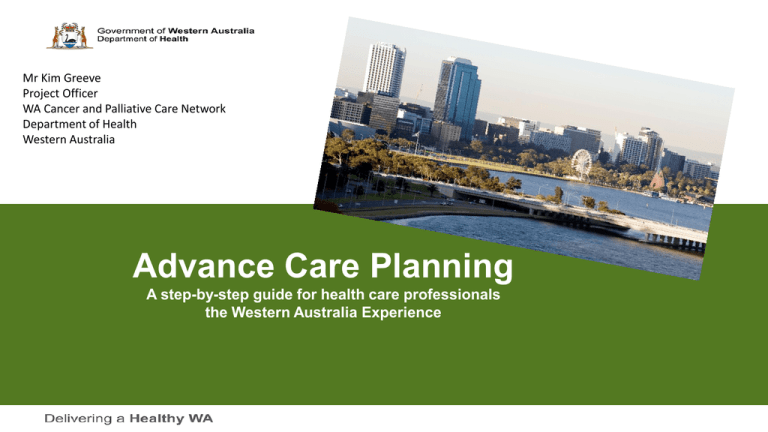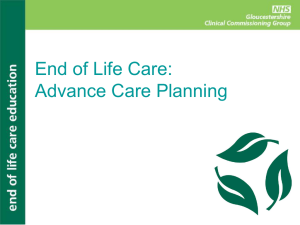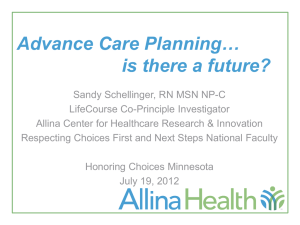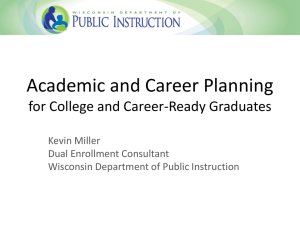PPT 6.15MB - Department of Health
advertisement

Mr Kim Greeve Project Officer WA Cancer and Palliative Care Network Department of Health Western Australia Advance Care Planning A step-by-step guide for health care professionals the Western Australia Experience E-Poster Purpose of this E-Poster To inform WA Health of work undertaken, in developing a resource to guide health professionals in having Advance Care Planning Discussions. Background Introduction of, Acts Amendment (Consent to Medical Treatment) Act 2008. As a result two legal powers became available: • Advance Health Directive (AHD) • Enduring Power of Guardianship (EPG) There is a lack of uptake of Advance Health Directives (AHD) legislation nationally. Advance Care Planning is a way of addressing this issue. Our Aim To promote Advance Care Planning (ACP) and improve the incidents of ACP discussions between health care professionals and consumers/patients. To promote Advance Care Planning (ACP) where the focus is on good care planning as an essential component of clinical practice. Advance Care Planning Advance Care Planning (ACP) is a process of making decisions about future health care for patients in consultation with clinicians, family members and important others. It aims to ensure patients wishes are respected if they lose decisional capacity. (Scott, Mitchell et al) ACP may include completing: • Advance Health Directive • Enduring Power of Guardianship • Common Law Directive “Living Will” • Advance Care Plan Reference Group Established The Role of the reference group in addition to providing leadership was to determine barriers and identify those people who could be amenable to Advance Care Planning discussions. Provide Leadership Patients often wait for their doctor to initiate an ACP discussion. Triggers & Prompts Triggers, Prompts, Clinical Indicators • Clinicians often wait for their patient or family members to initiate an ACP discussion. • General practitioners often wait for a signal from the patient’s specialist before initiating an ACP discussion. (Scott, Mitchell et al) Triggers, Prompts, Clinical Indicators Health care professionals, therefore, need a way of indentifying those patients who may benefit from ACP discussions. Our resource provides a list of triggers, prompts and clinical indicators to assist health professionals with identifying patients who may benefit from an ACP discussion. Triggers, Prompts, Clinical Indicators Triggers Would you be surprised if your patient died in the next 12 months? Prompts Your patient or their family asks questions, make statements such as: Triggers and Prompts Clinical Indicators Disease Specific Clinical Indicators Our resource also provides evidence based clinical indicators for the following: Renal disease Heart failure Neurological disease Chronic lung condition Cancer and generic clinical indicators Clinical Indicators Clinical Indicators Generic Clinical Indicators Clinical Indicators Initiating A Discussion Our resource also provides guidance with undertaking an ACP discussion. Such discussions can then be documented, for example, within: Advance Care Plan; AHD/EPG/EPA; NFR orders, Documented summary of ACP discussions within the medical record and Amending care plans. Health Professionals identifying Patients, initiating and documenting discussions. Resources Developed They don’t stand alone www.health.wa.gov.au/advancehealthdirective What’s Next ? Staff • Training staff in – initiating ACP discussions • Online resources • Pilot General Public • Patient guide (which includes an ACP form) • Brochure • Online resources Thankyou Kim Greeve Kim.greeve@health.wa.gov.au Tel: +61 8 9222 0256 References Scott IA, Mitchell GK, Raymond EJ, Daly MP. Difficult but necessary conversations – the case for advance care planning. MJA. 18 Nov 2013; 199 (10) : 662-666.











